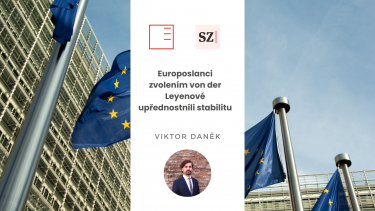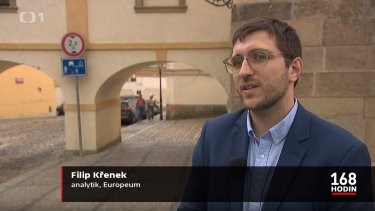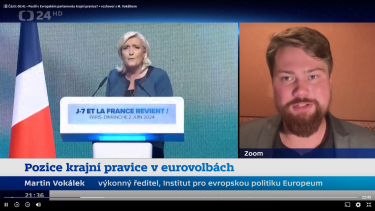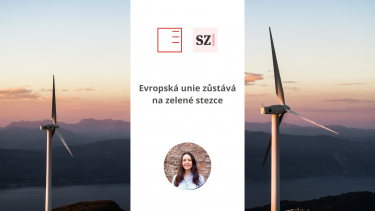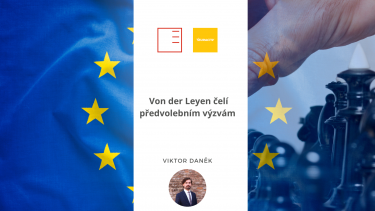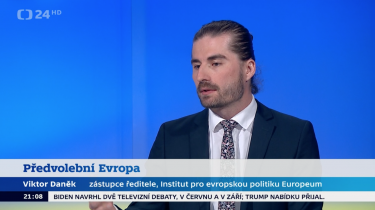Seznam Zprávy | By electing von der Leyen MEPs prioritized stability
The current head of the European Commission, Ursula von der Leyen, will remain at the helm of the EU's most prominent body, as decided by MEPs on Thursday. Although Thursday's vote was expected to be close, she ultimately secured 401 votes, forty more than needed. She even achieved a better result than five years ago, when she won by just nine votes. Viktor Daněk, Deputy Director of EUROPEUM Institute, gave an interview to Seznam Zprávy about her re-election.
Show moreČT24 | Von der Leyen re-elected as president of the European Commission
Ursula von der Leyen has retained her position as President of the European Commission. She received a total of 401 votes, significantly exceeding the required majority of 361 votes. The result was not as close as expected. What ultimately helped her achieve victory? And how difficult was it for her to negotiate support? Deputy Director and Head of the Brussels Office of EUROPEUM Institute, Žiga Faktor, commented for ČT24.
Show more
168 hodin | Who is the surprise of the European election?
Filip Turek, originally an outsider, pulled the Přísaha and Motorists coalition into third place and gained more than ten percent of the vote. He bet on a ban on internal combustion engines and social networks. How realistic are his election promises? Who did he take votes from and who helped him? Filip Křenek, Project Coordinator and Analyst at EUROPEUM Institute, commented on the topic for Czech Television's investigative programme 168 hodin.
Show more
ČT24 | The position of the far right in the EU elections
Political analysts and pre-election polls predict a strengthening of the right or far right after the European Parliament elections in June. The success of the populists may be due to a change in priorities among younger voters. This group may feel overlooked and disadvantaged compared to older generations. Martin Vokálek, Executive Director of EUROPEUM Institute, commented on this issue.
Show more
Seznam Zprávy | The European Union remains on the green path
The green parties has weakened, while the eurosceptic, far-right and climate-sceptic factions have strengthened. However, this is unlikely to be a significant obstacle to the implementation of the Green Deal for Europe. The parties behind it have retained the most seats. What implications will the results of the European Parliament elections have for the Union's climate and environmental policy over the next five years? Senior researcher of EUROPEUM Institute Kateřina Davidová commented for Seznam Zprávy.
Show more
Euractiv | Ursula von der Leyen faces pre-election challenges
If Ursula von der Leyen wants to sit at the head of the European Commission for a second term, she will likely have to prepare a less green program than five years ago. While no surprises are expected for her nomination, a power shift is anticipated in the European Parliament, which approves the new head of the Commission. Pre-election models predict a strengthening of parliamentary factions critical of the Union. Viktor Daněk, Deputy Director of EUROPEUM Institute, commented for Euractiv.
Show moreHospodářské noviny | Who has the biggest influence in Brussels? EUROPEUM presents the ranking of Czech MEPs
MEPs who are running for re-election in the upcoming European Parliament elections emphasize their influence in Brussels and Strasbourg, as well as their ability to shape public opinion in the Czech Republic. The actual extent was examined by EUROPEUM Institute, which compiled a ranking of the influence of Czech MEPs based on a survey of 100 Czech EU experts. Vít Havelka from EUROPEUM Institute discussed this ranking in Hospodářské noviny.
Show more
ČT24 | EU elections
According to predictions, conservative right-wing parties are expected to gain strength in the upcoming European elections. How significant will their influence be? Or do they only have blackmail potential? Will the rhetoric change in traditional EU parties as well? Viktor Daněk, Deputy Director of EUROPEUM Institute, answered these questions on the programme "Pre-election Europe" on ČT24.
Show moreThe Parliament Magazine | From Pfizer to Pieper: With von der Leyen on the defensive, who stands to gain?
Two recent controversies – Pfizergate and Piepergate – have thrown a wrench into Ursula von der Leyen’s re-election bid for the European Commission presidency. What impacts will they have and who will benefit form them? Žiga Faktor, head of EUROPEUM´s Institute Brussels office, comments in an article for The Parliament Magazine.
Show more
MF DNES | Czech Republic abstained in the vote on the migration pact
The Czech Republic abstained in the vote on the EU migration pact, despite having promoted it so far and participated in its preparation. In addition to criticism of the bureaucratic burden, it may also be a strategic move ahead of the upcoming European Parliament elections. Our deputy director Viktor Daněk commented on the Czech Republic's position for the MF Dnes daily.
Show moreStaroměstské náměstí 4/1
Prague 1 - Staré Město
110 00
tel.: +420 212 246 552
email: europeum@europeum.org
https://www.europeum.org
